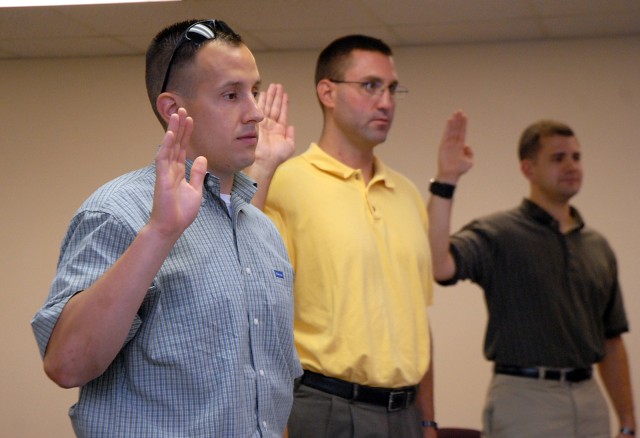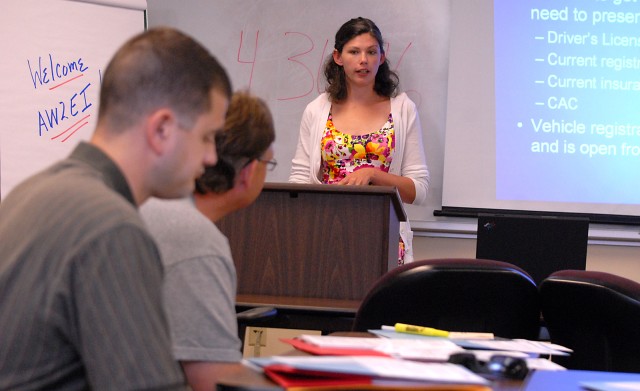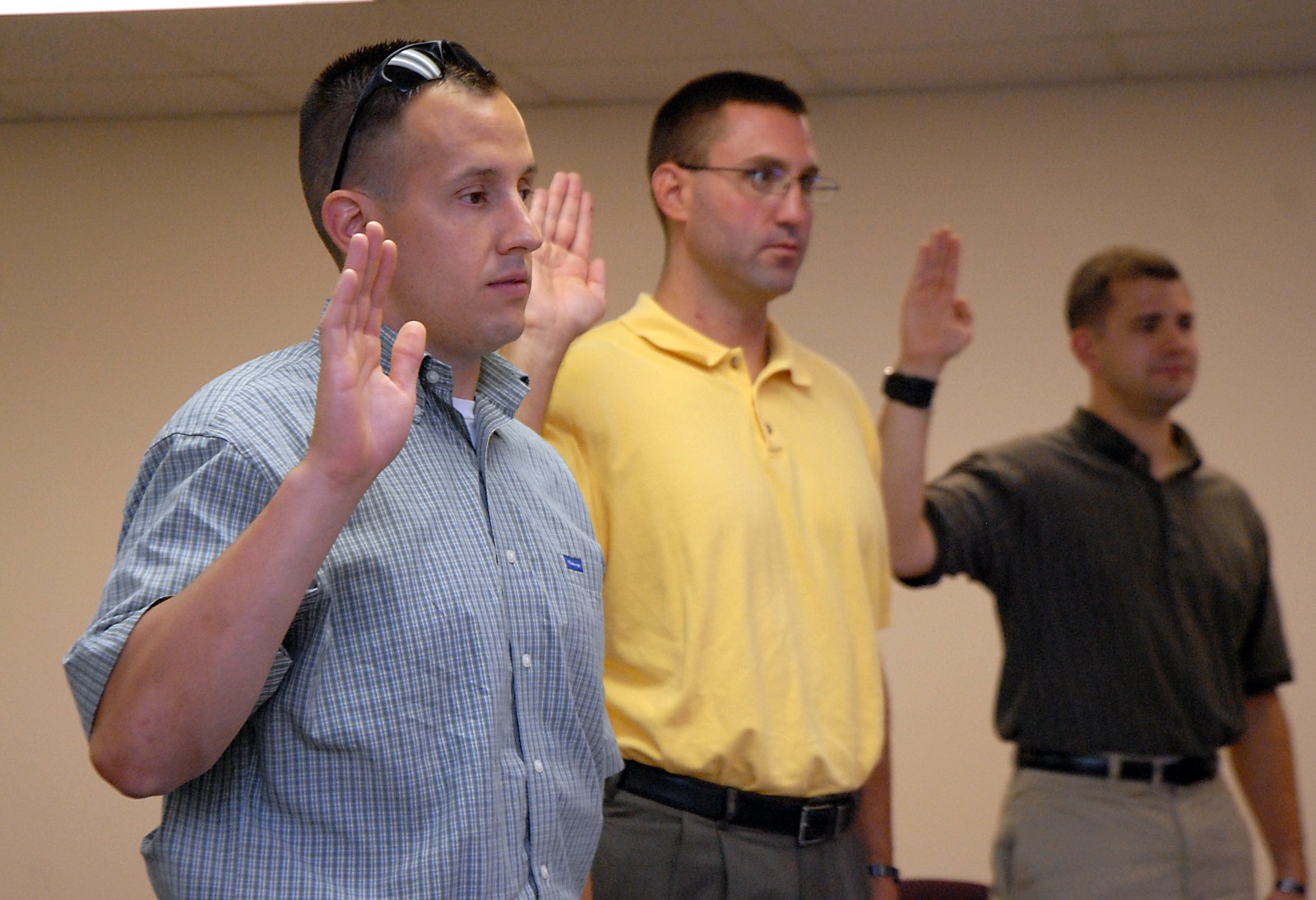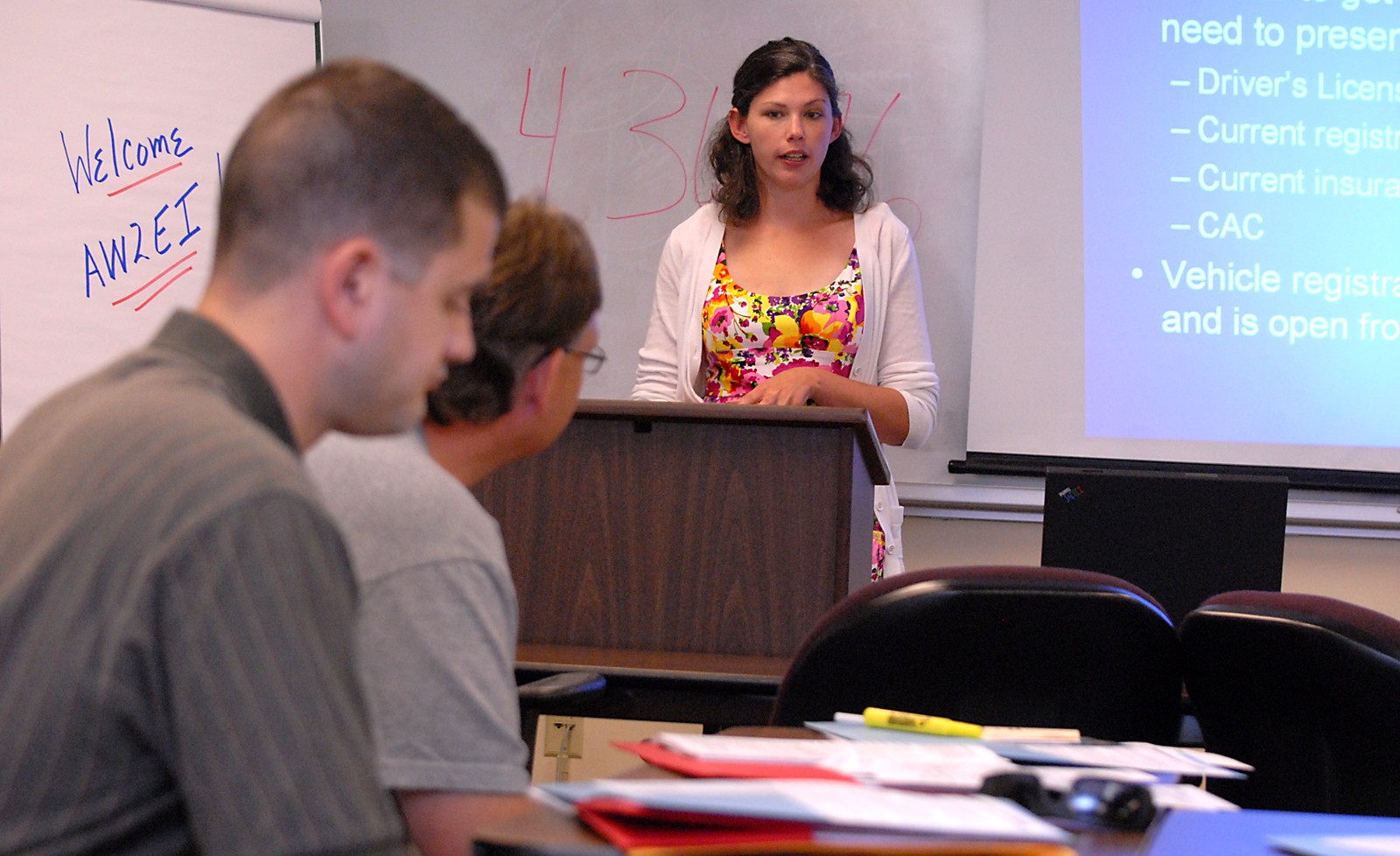FORT LEAVENWORTH, Kan. (July 16, 2009) --A,A Tom Wiggins was shot in Afghanistan in 2004, recovered from his wounds, started a family and became president of a company - but he wasn't done serving the Army.
On July 13, 2009, about five years after he medically retired, Wiggins was sworn in as a Department of the Army civilian through the Army's Wounded Warrior Education Initiative along with four other recent combat veterans. The program is a partnership with the Army and the University of Kansas that allows wounded warriors to earn a master's degree paid for by the Army.
The intent of the program is to educate Soldiers so they can serve as trainers and educators throughout Training and Doctrine Command institutions. Students will teach three years for each year in the program.
"Who better to stand up and instruct current students than deployed vets'" said Beth Burns, a human resources specialist for the Civilian Personnel Advisory Center.
The first students joined the education initiative in 2008 and are entering their second year in various master's degree programs. They will serve as sponsors for the 2009 class, which includes Nathan Dehnke, John Gelineau, Rob Laurent, Kevin Nemetz and Wiggins. All 2009 class members except for Laurent live in Lawrence, Kan., near the university.
Along with Fort Leavenworth staff, Lt. Col. Warren Dewey, Wounded Warrior Education Initiative program manager and instructor at the Command and General Staff College, organized an orientation session on post to help each student learn about being an Army civilian.
Dewey said each student had to meet several requirements including recent deployment to Iraq or Afghanistan and wounds from that deployment. Students must have a bachelor's degree and meet KU requirements for entering a master's degree program. The education initiative also takes a look into each student's military background to ensure success in the program.
Adrian Lewis and Dawn Tallchief are director and assistant director of the KU Office of Professional Military Graduate Education. Tallchief said the program is one of high significance at KU.
"It solidifies and strengthens our relationship with Fort Leavenworth and allows us to reach out to other branches of the military as well," she said.
Several of the second group of wounded warrior students are bringing families with them to study in Kansas. Wiggins and his wife, Leslie, have a 1-year-old daughter.
Wiggins deployed to Iraq once and Afghanistan several times for various special operations missions. He was deployed with the 1st Ranger Battalion when he was wounded. Wiggins' May 13, 2004, injury to the back of his head left him completely deaf, but he is able to hear through a cochlear implant provided by the Army.
Wiggins has a business degree from Linfield College in McMinnville, Ore., and worked at Evergreen International Aviation as company president. Wiggins wants to return to his native Gainesville, Fla., to teach ROTC at the University of Florida. He is pursuing a master's in curriculum and instruction.
Laurent and his wife, Briley, live in Olathe, Kan., with their three children.
Laurent was injured Dec. 24, 2004, near Samarra, Iraq, by an improvised explosive device, causing him to lose his right eye. The fingers on his left hand had to be amputated above the first joint because of shrapnel injuries. He also lost his pinky finger.
Laurent, a Baton Rouge, La., native, comes to the program with a degree in criminal justice and forensic psychology from Texas State University. He is the first in the wounded warrior education program to seek a master's in supply chain management, a business degree. He said he's willing to teach wherever the Army sends him.
Nemetz had to leave six of his eight children behind in Michigan to attend the program in Kansas for two years. His two oldest sons serve in the military.
Nemetz served in the Michigan Army National Guard and had 16 years total military service with seven years active duty in the Army. He was deployed to Iraq from June 2006 to July 2007 as a platoon sergeant.
Nemetz was injured in three separate IED attacks. He also dislocated his shoulder during a raid. Once, a sniper fired on Nemetz and missed, hitting the wall and sending shrapnel into his face.
"They couldn't take (the shrapnel) out in Iraq; I had to go back to the U.S. to get it out," he said.
As a result of his injuries, Nemetz suffers from a severe nervous disorder and traumatic brain injury.
In his civilian life, Nemetz was a social worker and corrections officer in Michigan. His bachelor's degree is in family relations. His goal is to earn a master's in teaching and curriculum at KU so he can help veterans and convicted felons rebuild their lives.
Nemetz is also seeking a graduate certificate in substance abuse counseling, a separate program, which requires six hours of graduate credit.
Two students in the program discovered they were wounded a day apart in Iraq. Gelineau was injured June 2, 2007, and Dehnke was injured June 3 - both by an IED. They only recently met through the education program.
Gelineau was an infantry platoon leader. His Stryker vehicle hit an IED that had been buried underground. The vehicle blew up beneath him and shattered his left leg below his knee and left behind shrapnel wounds.
Dehnke was investigating suspicious activity on a nearby bridge when his vehicle was blown up by an IED. His unit caught small arms fire after that. Dehnke was blinded in the left eye with nerve damage in his left leg and left foot.
Dehnke came to the Army with five years of teaching experience in his native St. Louis, Mo. His bachelor's degree is in elementary education and he also taught physical education. Dehnke is seeking a master's degree in political science. He'll be an instructor upon graduation, he said, but also hopes to serve on the political side of government one day, too.
Gelineau has a bachelor's in criminal justice from California State University at Fullerton. He is seeking a master's in international studies at KU. Gelineau wants to return to his native Columbus, Ga., and teach at Fort Benning, Ga.
"I've always been interested in teaching," he said. "It's a great opportunity to get my master's degree and serve my country and help serve Soldiers."
He and his wife, Nicole, will celebrate their one-year anniversary this fall.
Chief Warrant Officer Ari Jean-Baptiste is a current student in the program. He has completed one year of study toward a master's in political science with an emphasis on terrorism and armed conflict. Jean-Baptiste's goal is to teach at CGSC upon graduation next year.
As a member of the first group of students, Jean-Baptiste will serve as a sponsor and mentor for the second group. He said graduate-level coursework can be difficult for anyone.
"It's a strange lesson in management," he said. "You have to learn to manage your time between life and school."




Social Sharing